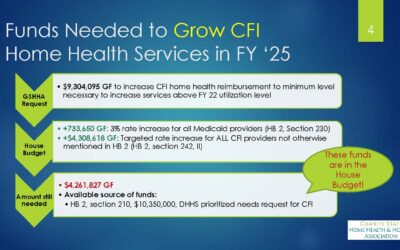Source: Concord Monitor – Scott Merrill
Some of the neediest people in New Hampshire are being unnecessarily institutionalized. That’s according to a lawsuit filed in federal court Jan. 11.
The suit, filed by New Hampshire Legal Assistance, Disability Rights Center – New Hampshire, AARP Foundation, and the Manchester office of Nixon Peabody LLP, pertains to New Hampshire residents who depend on the state to provide them with Medicaid-funded long-term care and the state’s failure to properly administer its Choices for Independence (“CFI”) Medicaid waiver.
The suit alleges that New Hampshire’s failure to deliver CFI services places a class of individuals at risk of unnecessary and dangerous institutionalization in long-term-care facilities.
“Some of our most vulnerable citizens are one crisis away from unnecessary institutionalization because they are not getting essential CFI services. Without these services, they linger for hours or days alone in bed or confined in their own homes, unable to attend to basic personal needs. The State has long been aware of these problems and we cannot wait any longer for a solution,” said Pamela Phelan, DRC-NH’s litigation director.
The suit names the New Hampshire Department of Health & Human Services (NHDHHS) Commissioner Lori Shibinette and NHDHHS as defendants and seeks to compel them to operate New Hampshire’s CFI waiver program in accordance with the Americans with Disabilities Act, Section 504 of the Rehabilitation Act of 1973, the Medicaid Act, and due process provisions of the Constitution of the United States.
New Hampshire’s CFI Waiver is designed to provide vital assistance to qualified people who choose to continue living in their homes, and to avoid the need for costly and restrictive nursing facility placements.
“The point is to finance care for the neediest. A CFI waiver is part of NH’s Medicaid program. If someone is found eligible it’s like a guarantee from the state you will receive the care and services you need in your home and won’t need to be living in an institution such as a nursing facility,” Nixon Peabody attorney Kierstan Schultz said.
Medicaid is program that offers medical coverage and long-term care assistance for low income Americans and anything the state pays for the federal government will match dollar for dollar, Schultz explained.
According to the suit the state is currently operating the CFI program in a manner that “systematically deprives CFI participants of the home and community-based care to which they are entitled to under the provisions of the waiver program.”
NHDHHS contracts with case management and other service provider agencies to deliver CFI Waiver services to CFI Waiver participants.
According to the complaint New Hampshire’s shortage of service providers has limited the delivery of personal care, home health aide, and homemaker service providers, resulting, in part, “from the state’s failure to set adequate rates for CFI Waiver services relative to the compensation provided to nursing facilities and other competing businesses.”
Yet, the complaint continues, “Defendants have also failed to take reasonable non-monetary measures to increase the number of available CFI Waiver service providers. Developing an adequate number of service providers requires active efforts to recruit, train, and place would-be providers. Other health care professionals in New Hampshire have recognized the need for active recruitment of service providers and have sought and obtained the resources necessary to do so.”
One of the legal arguments made in the complaint focuses on the United States Supreme Court’s Olmstead decision which held that unnecessary institutionalization of individuals with disabilities is a form of discrimination under Title II of the ADA. 527 U.S. at 597, 601. In so holding, the Supreme Court interpreted the ADA’s “integration mandate” as requiring persons with disabilities to be served in the community when: (1) the state determines that community-based treatment is appropriate; (2) the individual does not oppose community placement; and (3) community placement can be reasonably accommodated. 527 U.S. at 607.
“When CFI participants are deprived of the community-based long-term care that the state concedes they need and are entitled to, they face grave health risks and it’s illegal,” said AARP Foundation Senior Attorney M. Geron Gadd.
The complaint features four plaintiffs, “Stephanie P,” 34, “Emily F,” 36, “Kathleen B,” 59, and “Paul S,” 69, listing the qualifying conditions which make them eligible for the CFI program.
According to the complaint, Stephanie P “has been diagnosed with Hypermobile Ehlers-Danlos Syndrome, Chiari Malformation/Low lying cerebral tonsils, Hypogammaglobulinemia, Mast Cell Activation Syndrome, Dysautonomia, Gastroparesis, Postural Orthostatic Tachycardia Syndrome, Neurally mediated syncope, other spinal instabilities in the C-spine and upper T-spine, Neurogenic bladder, a history of bacteremia and recurrent staphylococcus aureus infection, complex PTSD, and a variety of environmental allergies. She requires the administration of medication through a port, and uses a wheelchair for mobility. When in her home, Stephanie is usually confined to her bed or wheelchair and she is at risk for falls.”
The complaint also states that Stephanie waited nearly a year to receive any of the personal care and homemaker CFI services she was determined to need and that her condition, due to this lack of care, has worsened so that a wheelchair is now required.
One common theme for the plaintiffs is a failure on the part of NHDHHS to provide notification advising patients that their services are not being provided and that they have a right to a fair hearing to seek redress. This has led to significant breaks in service for the plaintiffs which creates a spiral effect according to Schultz.
“Each of the plaintiffs are at risk of an unnecessary institutionalization and the chances that once they enter an acute care hospital they’ll be discharged to their home are very low,” she said. “The chances they will be discharged to a rehab facility or nursing facility are much higher.”
The Jan. 11 lawsuit comes after a year-long investigation into the CFI program, and the number of deaths in long term care facilities due to the coronavirus pandemic has illustrated the urgency of keeping people at home when possible, according to Schultz.
“The alarming number of Covid related deaths in our state has made the dangers of being forced to live in nursing facilities and hospitals clear,” she said.
In New Hampshire, 80% of all COVID-19 deaths have involved residents of long-term care facilities – double the national average.
“Failure to properly administer the CFI Waiver not only deprives participants of their right to live as they choose, but also greatly increases their chances of exposure to COVID-19 in nursing homes and other long-term care facilities,” Gadd said.
“This is a Medicaid waiver program that helps people transfer themselves from their beds to chairs and toilets, to get into and out of the shower, and to prepare meals. Without these services people can’t use the bathroom or shower and sometimes go long periods without liquids. With services they can maintain connections in their homes and allows them to live independently and is generally much less costly than in patient or institutional settings.”
The state Department of Health and Human Services was contacted for this article but did not immediately respond for a request for comment.
These articles are being shared by partners in The Granite State News Collaborative. For more information visit collaborativenh.org.


